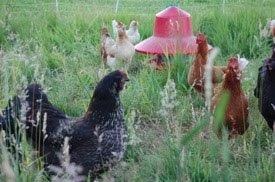Misty Meadows Farm

| Total Score | 2320 |
They write: “Misty Meadows Farm is a small family farm wanting to raise the very best food we can for our own table and for our friends and neighbors. We are certified organic and seek in all ways to treat the land and the animals in ways that are respectful, healthy and sustainable. We began in 2005 with three pet hens and now have a flock of over 750 laying hens. Our eggs can be found at locally owned grocery stores and restaurants throughout Bellingham, WA.”
“All of our poultry are pasture raised. Our birds have continuous access to grass and fresh air. We rotate the birds around our 18 acre property providing a year-round supply of fresh pasture. Our birds have open air coops that protect them from severe weather, but they are never confined. In 2007, our eggs were tested by a nutritional testing lab as part of a nationwide study sponsored by Mother Earth News magazine. Misty Meadows Farm eggs had three times the vitamin E, four times the heart healthy Omega 3s, a third less cholesterol, and a third less saturated fat than eggs from factory farmed birds.”
| Ownership Structure | 100 |
| Average Flock Size | 100 |
| Single or Double Henhouses | 100 |
| Other Certifications (bonus points) | |
| Organic Certifier | 100 |
| Commitment to Organics | 100 |
| Indoor Space per Bird | 100 |
| Indoor Enrichments | 100 |
| Litter Management | 100 |
| Natural Light | 100 |
| Outdoor Space per Bird | 100 |
| Popholes/Exit to the Outdoors | 100 |
| Outdoor Enrichments | 100 |
| Outdoor Space Exemptions | 100 |
| Outdoor Management System | 70 |
| Manure Handling System | 100 |
| Forced Molting | 100 |
| Beak Trimming | 100 |
| Laying Hen Lifespan | 80 |
| Use of Spent Hens | 100 |
| Death Loss Rate | 20 |
| Pullets | 80 |
| Pullet Access to Outdoors | 80 |
| Feed Produced on Farm | 50 |
| US Grown Feed | 70 |
| Soy in Feed | No |
| Synthetic Amino Acids | 70 |
| Disclosure Rate | 100 |

